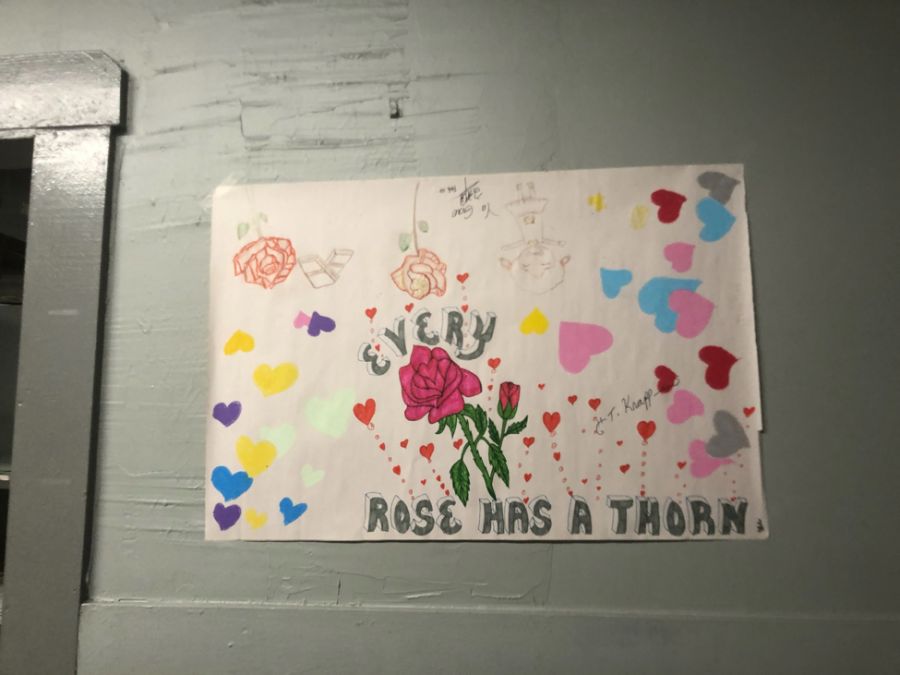Cai: Be a friend, not a savior
This artwork from a homeless man whose house burnt down reminds us that despite our differences, we can all enjoy art.
I still remember when I first visited the Lutheran Metropolitan Ministry’s Men’s Shelter. The coordinator of volunteers warned me over and over again not to come alone or by public transportation.
“Are you sure you are okay working with them, even if they have mental problems, use drugs or have been to prison?” she emphasized.
I remember my first time taking a group there, nervous, intimidated, worrying if anyone would join us. Gladly, one guy came over and sat down, and then another.
It’s been a semester now since I started the art workshop there.
It wasn’t hard to realize how different we were from these homeless people at all. At our first workshop, a man came and sat next to me and proposed that we fill the canvas with Louis Vuitton logos, Rolex watches and diamonds, while the rest of us were painting squirrels and animated figures. Sometimes we weren’t on the same page. They rapped the songs they wrote to us, and the lyrics didn’t really make sense to us. Their slang confounded us, and they sometimes quarreled for reasons we didn’t understand, because we’ve had such different upbringings and life experiences.
Once I picked up old magazines from the campus to do a collage, and a young man became intrigued by a copy of “Discussion.” “Can we just read these magazines instead of cutting them?” he asked. I never thought these magazines, lying on bookshelves and eventually ending up in trash bins, could be so precious to others.
A rapper talked about his music all the time. He dreamed of being famous, releasing albums all over the world and most importantly of being rich. He knew that I came from Shanghai, and he wanted go to Shanghai and shoot music videos under the neon light billboards. He asked me how much a ticket to Shanghai was, and I can never forget the tears in his eyes when I told him it was a thousand dollars for one way.
People came here with stories, and mostly not so delightful ones. It’s amazing that they are still looking forward. By coming to the shelter, they are trying to find a way out of homelessness. Under all the pressure they have to go through, they are thriving, and they are nurturing a distinctive and resilient culture of their own.
Their art is non-mainstream. Their paintings have harsh lines with no hesitation. None of the works are perfection: They are rough, chaotic and aggressive. They paint people they met, places they missed, swear words, nudity … Their art is nowhere near pleasing, but it is somehow alive. I feel their paintings scream their lives.
Sadly, we might never be able to eliminate the artificial difference between us, not in such a short time. What we students can do is hear their voices, and see what amazing things they have made out of that difference. We can cry out for social change, but we should also preserve their culture.
As different as we are, I know we are connected on a deeper level. Some of us like the same rock band. We would paint Thanksgiving hand turkeys together commemorating this same childhood tradition. Sometimes, they went on and on about “when they were young” like any overly verbose relative would do. I see a shared humanity in all of us.
On Valentine’s Day, an intimidating man with tattoos joined our artwork. It was such an amusing contrast when he started painting roses and hearts. He wrote on the canvas, “Every rose has a thorn.” Later we learned he just got his house burnt down and he had to come here. He talked about it like yesterday’s television show.
Anyone can become homeless. A fire, a car accident, a divorce, a business failure … So many unpredictabilities in life can take one’s home away. After I’ve seen their thriving culture and their optimism towards life, I feel even more strongly that we are nowhere better and we are in no position to say that their lives are more miserable. They are just unlucky.
Help them as a friend but not a savior, and more importantly, listen to their voices as part of the community, for every rose has a thorn.


